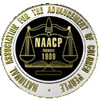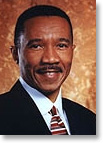
PHILADELPHIA (FinalCall.com) – The National Association for the Advancement of Colored People (NAACP) celebrated its 95th anniversary less than a mile from where one of its founding fathers, W.E.B. DuBois, conducted his historic social study on Black life, published as “The Philadelphia Negro.”
The theme of this year’s July 10-15 convention, held at the Pennsylvania Convention Center, “The Race Is On,” had double meaning for delegates. It described a people “on point, on course” and “vigilant” to the “inequities and opportunities ahead,” as well as being aware of the race to “win greater self-determination from the voting booth to the marketplace.”

Nearly 8,000 members, delegates and visitors listened to prominent speakers, including U.S. Supreme Court Justice Stephen G. Breyer, Pennsylvania Governor Edward Rendell, Philadelphia Mayor John Street, presidential candidate John Kerry, Harvard Law Professor Charles Ogletree, Miss America 2004 Erica Dunlap, former Essence editor Susan Taylor, Bishop Vashti McKenzie, and entertainers Bill Cosby and Frankie Beverly & Maze.
Although the conference opened July 10, the fireworks began the preceding week with a snub from President George Bush, which earned him the distinction of being the first sitting president since Herbert Hoover not to attend an NAACP convention.
According to published reports, Pres. Bush complained to reporters about being criticized by the group.
White House spokesman Scott McClellan said the President would address Blacks by attending the Urban League Convention, characterizing the Urban League as a better setting for the President.
Perhaps adding insult to injury, the convention showed Michael Moore’s documentary, “Fahrenheit 9/11” free and open to the general public, which is extremely critical of the Bush administration.
Then, there was presidential candidate John Kerry at the convention wading through the crowd to the dais, shaking hands while “We are Family” by Sister Sledge played in the background. If the audience made him feel they already backed him, he responded in his less-than-enthusiastic style, trying to motivate the delegates to get out the Black vote.
“This election now, my friends, even three-and-a-half months out–that’s all it is, I think it is 112 days today, if I’m correct–it is more in your hands than in mine. Over the next three-and-a-half months, we need you to do what nobody in America does better, register voters, talk to voters, talk to your neighbors, and get people to the polls.”
But if Mr. Kerry wanted an endorsement from the non-partisan organization’s leadership, he didn’t receive it. Delivering the convention’s opening remarks, NAACP President Kweisi Mfume told the audience that “some in the Democratic Party take our votes for granted.”
During an exclusive interview with The Final Call, he clarified his remarks stating that we owe a debt of responsibility to the “legions of Black men and women” who “made their bodies bridges” so Blacks today can exercise their franchise.
“I’m a person of expectation,”he stated. “After the election, depending on who’s in office, I’m going to have a whole lot of expectation and I’m going to have that as a result of votes that I’ve delivered.”
Dr. Anthony Monteiro shared the significance of this year’s convention. “This is one of the most important conventions in the history of the NAACP, because it’s one of the most important moments in history,” the professor of African American studies at Temple University said.
According to Dr. Monteiro, who participated at the convention as an observer, not only has the NAACP convention “prepared their membership for grassroots mobilization in the upcoming November election, (but) I think their tactical and strategic perspective includes not only the defeat of Bush, but the defeat of the Republican-controlled House of Representatives and perhaps the Senate.”
Does that play into the hands of the Democrats?
“I think that is the big question. I think the NAACP under the Mfume and the Bond leadership faces that problem,” Dr. Monteiro maintained.
He also believes the two leaders have a “clear vision” of what the “overriding political tasks are.”
Discussing the NAACP’s current focus, Dr. Monteiro believes the civil rights group has become more (of) a political organization “since its principle objectives are in the political struggle against the Right and ultra-Right.”
Developments at the convention included the organization taking a position on Pennsylvania death row inmate Mumia Abu Jamal, the former journalist who was sentenced to the death penalty for the shooting of a Philadelphia police officer.
For two years, delegates from New York and California have tried unsuccessfully to get the NAACP to take a position.
According to Linn Washington, who teaches Investigative Reporting and Communications Law at Temple University, the organization “reversed itself and will now adopt a resolution that reiterates its position against the death penalty, but also takes a stance calling for a fair trial for (Mumia) Abu Jamal.”
The convention’s agenda also included passing the baton to its youth members. John Michael Dawson, 18, the newly-elected president of his Los Angeles chapter at Pasadena City College, said attending the convention was a learning experience. He said the legal seminars and the information he received concerning the “prison industrial complex and how to react when approached by a police officer is what really impressed me the most.”












